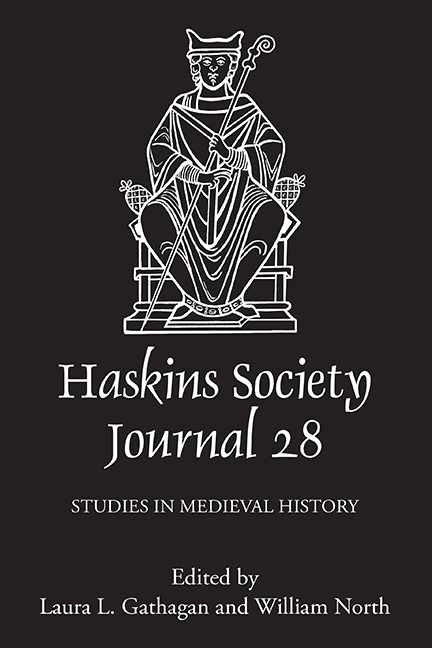Book contents
- Frontmatter
- Contents
- List of Figures and Tables
- Editors' Note
- Abbreviations
- 1 Under the ‘Romans’ or under the Franks? Venice between Two Empires
- 2 Lost and Found: Eadmer's De reliquiis sancti Audoeni as a Cross–Channel Solution to the Canterbury–York Dispute
- 3 Of Lost Libraries and Monastic Memories: Creating the Eleventh-Century Novalesa Miscellany
- 4 The Place of Henry I in English Legal History
- 5 ‘Goliath Thought David Rather Boastful’: Royal Masculinity in Kingless Societies
- 6 Well-Behaved Women? Agnès of Baudement and Agnès of Braine as Female Lords and Patrons of the Premonstratensian Order
- 7 ‘Videmus nunc per speculum’: The Mysticism and Naturalism of the Twelfth-Century imago mundi
- 8 The Norman Kings of Africa?
- 9 Punishing Adultery: Private Violence, Public Honor, Literature, and the Law
6 - Well-Behaved Women? Agnès of Baudement and Agnès of Braine as Female Lords and Patrons of the Premonstratensian Order
Published online by Cambridge University Press: 23 August 2019
- Frontmatter
- Contents
- List of Figures and Tables
- Editors' Note
- Abbreviations
- 1 Under the ‘Romans’ or under the Franks? Venice between Two Empires
- 2 Lost and Found: Eadmer's De reliquiis sancti Audoeni as a Cross–Channel Solution to the Canterbury–York Dispute
- 3 Of Lost Libraries and Monastic Memories: Creating the Eleventh-Century Novalesa Miscellany
- 4 The Place of Henry I in English Legal History
- 5 ‘Goliath Thought David Rather Boastful’: Royal Masculinity in Kingless Societies
- 6 Well-Behaved Women? Agnès of Baudement and Agnès of Braine as Female Lords and Patrons of the Premonstratensian Order
- 7 ‘Videmus nunc per speculum’: The Mysticism and Naturalism of the Twelfth-Century imago mundi
- 8 The Norman Kings of Africa?
- 9 Punishing Adultery: Private Violence, Public Honor, Literature, and the Law
Summary
The social structures and cultural mores of twelfth-century northern France promoted men, both lay and religious, yet the lives of two Picard women called Agnès demonstrate that an interest in that promotion could be shared by women. The elder, Agnès of Baudement, was a relatively obscure aristocrat who inherited the lordship of Braine around the year 1100. Her granddaughter, Agnès of Braine, married into the Capetian royal family and helped to build one of the great abbey churches of the Middle Ages before her death in 1204. Both women were intimately involved with the Premonstratensians. The two women operated as patrons of the order, and mediators on its behalf, helping the group to establish itself in the region around Braine. In this, they were motivated not only by genuine piety, but also by a recognition that to accord with widespread societal expectations and priorities would help to secure greater prominence for their family. This is not at all unusual – in fulfilling their roles as lords, as patrons, as mediators, as facilitators, neither Agnès was all that different from her peers. As many scholars have pointed out over the last thirty years, aristocratic and royal women did not have to buck the system, to be notorious or ‘extraordinary’, in order to wield power during the High Middle Ages.
Yet the lives and careers of these women are worth exploring as one of many case studies which must still be undertaken as scholars of medieval women work to deepen our understanding of how the particular contexts – social, religious, economic, political, and geographical – of a woman's life shaped her choices. Focusing on the careers of Agnès the elder and Agnès the younger illustrates two key points. First, that women were central to the functioning of aristocratic families and affinity groups in the Middle Ages. The Agnèses – as was the case for many medieval aristocratic women – were able to leverage both their natal and their marital connections across large distances for social and political ends. Second, examining the ways in which the two Agnèses worked to secure the prosperity of their families shows how strategies required to do so could shift over the course of a few generations.
- Type
- Chapter
- Information
- The Haskins Society JournalStudies in Medieval History, pp. 101 - 118Publisher: Boydell & BrewerPrint publication year: 2017

